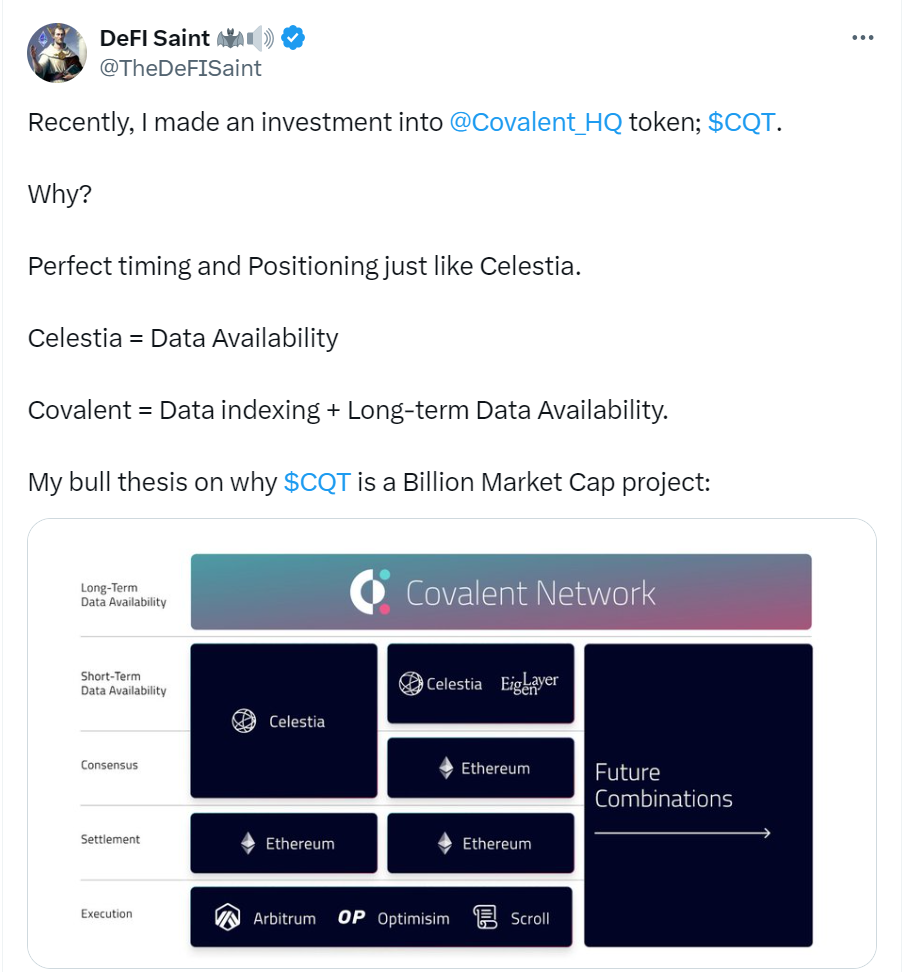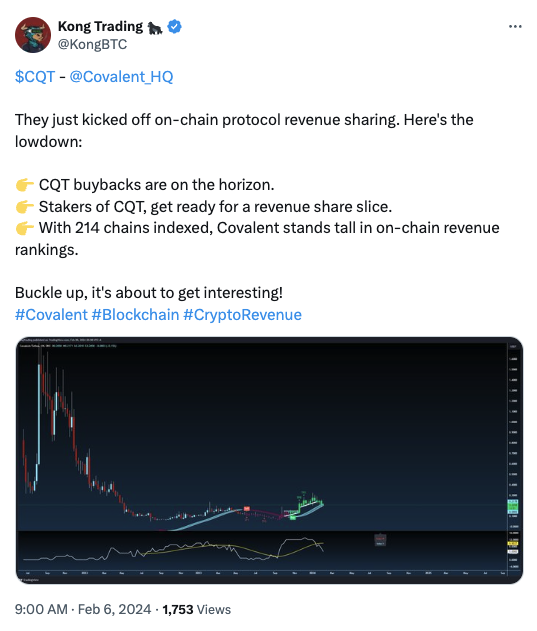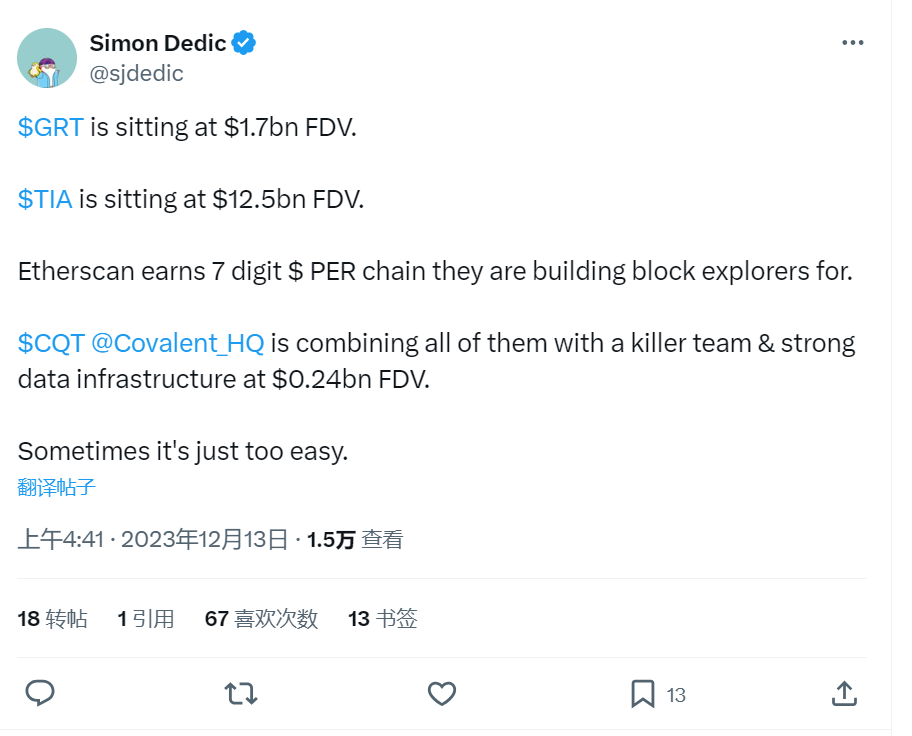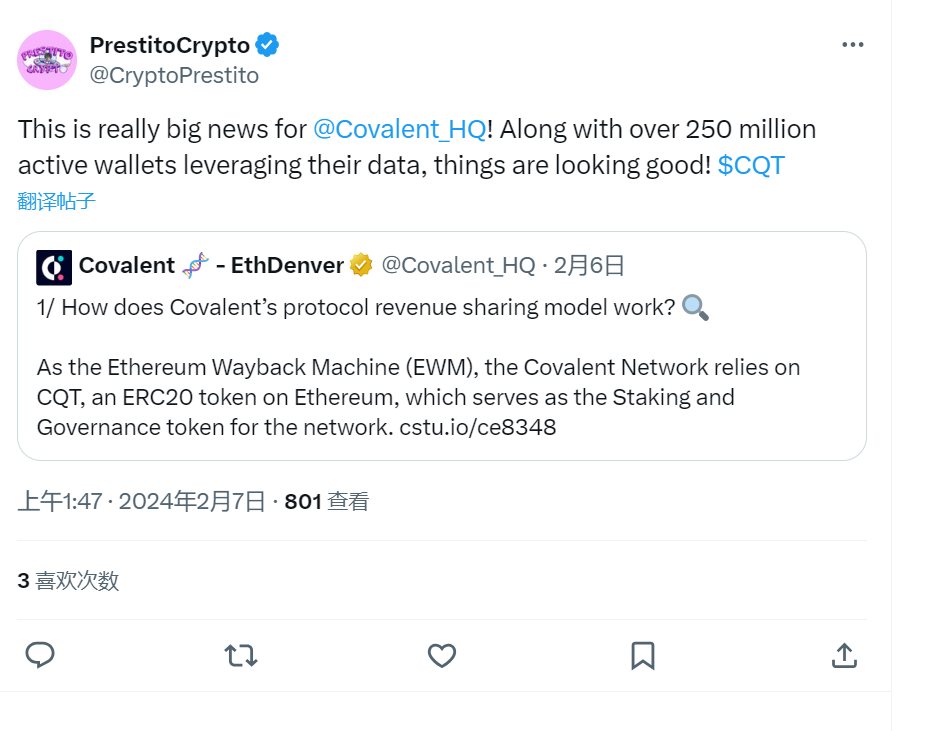 web3.0
web3.0
 Covalent Network's long-term data availability has been recognized and supported by many crypto KOLs
Covalent Network's long-term data availability has been recognized and supported by many crypto KOLs
Covalent Network's long-term data availability has been recognized and supported by many crypto KOLs

With the dynamic development of the Web3 ecosystem, the criticality of Covalent Network (CQT) is emerging to solve the problem of long-term data availability by providing a distributed, cryptographically secure data layer . Covalent Network (CQT) is more than just a tool, it is a transformative technology asset that is critical to a range of applications in the blockchain field, including artificial intelligence, DeFi, trading and governance. More than 240 million active wallet users around the world are using data from Covalent Network (CQT), which fully demonstrates its important position in the world of Web3 data availability.
Covalent Network (CQT) aims to solve the problems of obtaining, storing and transmitting blockchain data to provide scalable and practical solutions. Its groundbreaking unified API not only solves developer challenges but also enriches the end-user experience. The API provides seamless access to real-time blockchain data from over 200 networks, which will continue to drive the development of ecosystems and cross-chain networks and provide users with deeper data insights. Covalent Network (CQT) is committed to providing users with continuously expanded functionality and broader data support to improve the usability and user experience of blockchain applications.
What KOLs and Crypto Influencers Say
Covalent Network (CQT) has been a leader in Web3 structured data and long-term data availability. Its support has been expanded to include emerging fields such as artificial intelligence, where the demand for structured data is also increasing. Some key opinion leaders (KOLs) actively express their recognition and support for Covalent Network (CQT) on social media. Let’s take a deeper look:
Tweet 1:

Tweet 2:

Tweet 3:

Tweet 4:

The continuing impact of Covalent Network (CQT)
Covalent Network (CQT)’s unified API will continue to evolve and serve the ever-expanding blockchain community Ecosystems and cross-chain networks provide complex and nuanced insights. By promoting the diversified processing of real-time data, Covalent Network (CQT) not only provides timely, accurate and comprehensive information to more and more wallets, but also positions its own ecosystem at the forefront of growth categories such as artificial intelligence. Contribute to the dynamic expansion of the Web3 ecosystem.
About Covalent Network (CQT)
Covalent Network (CQT) focuses on blockchain data availability and supports millions of users to build a new economy. Since its establishment, Covalent Network (CQT) continues to help developers, analysts, etc. provide comprehensive, real-time data on more than 200 chains.
The above is the detailed content of Covalent Network's long-term data availability has been recognized and supported by many crypto KOLs. For more information, please follow other related articles on the PHP Chinese website!

Hot AI Tools

Undresser.AI Undress
AI-powered app for creating realistic nude photos

AI Clothes Remover
Online AI tool for removing clothes from photos.

Undress AI Tool
Undress images for free

Clothoff.io
AI clothes remover

Video Face Swap
Swap faces in any video effortlessly with our completely free AI face swap tool!

Hot Article

Hot Tools

Notepad++7.3.1
Easy-to-use and free code editor

SublimeText3 Chinese version
Chinese version, very easy to use

Zend Studio 13.0.1
Powerful PHP integrated development environment

Dreamweaver CS6
Visual web development tools

SublimeText3 Mac version
God-level code editing software (SublimeText3)

Hot Topics
 1393
1393
 52
52
 1206
1206
 24
24
 How long does it take to recharge digital currency to arrive? Recommended mainstream digital currency recharge platform
Apr 21, 2025 pm 08:00 PM
How long does it take to recharge digital currency to arrive? Recommended mainstream digital currency recharge platform
Apr 21, 2025 pm 08:00 PM
The time for recharge of digital currency varies depending on the method: 1. Bank transfer usually takes 1-3 working days; 2. Recharge of credit cards or third-party payment platforms within a few minutes to a few hours; 3. The time for recharge of digital currency transfer is usually 10 minutes to 1 hour based on the blockchain confirmation time, but it may be delayed due to factors such as network congestion.
 What does cross-chain transaction mean? What are the cross-chain transactions?
Apr 21, 2025 pm 11:39 PM
What does cross-chain transaction mean? What are the cross-chain transactions?
Apr 21, 2025 pm 11:39 PM
Exchanges that support cross-chain transactions: 1. Binance, 2. Uniswap, 3. SushiSwap, 4. Curve Finance, 5. Thorchain, 6. 1inch Exchange, 7. DLN Trade, these platforms support multi-chain asset transactions through various technologies.
 What is a quantum chain? What are the quantum chain transactions?
Apr 21, 2025 pm 11:51 PM
What is a quantum chain? What are the quantum chain transactions?
Apr 21, 2025 pm 11:51 PM
Quantum Chain (Qtum) is an open source decentralized smart contract platform and value transmission protocol. 1. Technical features: BIP-compatible POS smart contract platform, combining the advantages of Bitcoin and Ethereum, introduces off-chain factors and enhances the flexibility of consensus mechanisms. 2. Design principle: realize on-chain and off-chain data interaction through main control contracts, be compatible with different blockchain technologies, flexible consensus mechanisms, and consider industry compliance. 3. Team and Development: An international team led by Shuai Chu, 80% of the quantum coins are used in the community, and 20% rewards the team and investors. Quantum chains are traded on Binance, Gate.io, OKX, Bithumb and Matcha exchanges.
 What are the hybrid blockchain trading platforms?
Apr 21, 2025 pm 11:36 PM
What are the hybrid blockchain trading platforms?
Apr 21, 2025 pm 11:36 PM
Suggestions for choosing a cryptocurrency exchange: 1. For liquidity requirements, priority is Binance, Gate.io or OKX, because of its order depth and strong volatility resistance. 2. Compliance and security, Coinbase, Kraken and Gemini have strict regulatory endorsement. 3. Innovative functions, KuCoin's soft staking and Bybit's derivative design are suitable for advanced users.
 Quantum Chain Exchange Ranking Top 10 Recommended (Updated in 2025)
Apr 21, 2025 pm 11:48 PM
Quantum Chain Exchange Ranking Top 10 Recommended (Updated in 2025)
Apr 21, 2025 pm 11:48 PM
Quantum chains can be traded on the following exchanges: 1. Binance: One of the world's largest exchanges, with large trading volume, rich currency and high security. 2. Sesame Open Door (Gate.io): a large exchange, providing a variety of digital currency transactions, with good trading depth. 3. Ouyi (OKX): operated by OK Group, with strong comprehensive strength, large transaction volume, and complete safety measures. 4. Bitget: Fast development, provides quantum chain transactions, and improves security. 5. Bithumb: operated in Japan, supports transactions of multiple mainstream virtual currencies, and is safe and reliable. 6. Matcha Exchange: a well-known exchange with a friendly interface and supports quantum chain trading. 7. Huobi: a large exchange that provides quantum chain trading,
 The latest updates to the oldest virtual currency rankings
Apr 22, 2025 am 07:18 AM
The latest updates to the oldest virtual currency rankings
Apr 22, 2025 am 07:18 AM
The ranking of virtual currencies’ “oldest” is as follows: 1. Bitcoin (BTC), issued on January 3, 2009, is the first decentralized digital currency. 2. Litecoin (LTC), released on October 7, 2011, is known as the "lightweight version of Bitcoin". 3. Ripple (XRP), issued in 2011, is designed for cross-border payments. 4. Dogecoin (DOGE), issued on December 6, 2013, is a "meme coin" based on the Litecoin code. 5. Ethereum (ETH), released on July 30, 2015, is the first platform to support smart contracts. 6. Tether (USDT), issued in 2014, is the first stablecoin to be anchored to the US dollar 1:1. 7. ADA,
 Recommend several apps to buy mainstream coins in 2025 latest release
Apr 21, 2025 pm 11:54 PM
Recommend several apps to buy mainstream coins in 2025 latest release
Apr 21, 2025 pm 11:54 PM
APP software that can purchase mainstream coins includes: 1. Binance, the world's leading, large transaction volume and fast speed; 2. OKX, innovative products, low fees, high security; 3. Gate.io, a variety of assets and trading options, focusing on security; 4. Huobi (HTX), low fees, good user experience; 5. Coinbase, suitable for novices, high security; 6. Kraken, safe and compliant, providing a variety of services; 7. KuCoin, low fees, suitable for professional traders; 8. Gemini, emphasizes compliance, and provides custodial services; 9. Crypto.com, providing a variety of offers and services; 10. Bitstamp, an old exchange, strong liquidity,
 Why should you listen
Apr 21, 2025 pm 09:00 PM
Why should you listen
Apr 21, 2025 pm 09:00 PM
Concordium: A public first-level blockchain platform that takes into account privacy and compliance is a public first-level blockchain platform. Its core lies in the clever integration of identity verification with privacy and regulatory compliance. Founded in 2018 by Lars Seier Christensen, the platform’s core technology embeds cryptographic identities at the protocol level of each transaction. This unique design ensures responsibility traceability while protecting user privacy, effectively solving the problem of conflicts between anonymity and regulatory requirements in the blockchain field. To alleviate this problem, Concordium utilizes Zero Knowledge Proof (ZKP) technology, allowing users to verify specific identity attributes without the need to disclose unnecessary personal information. This means that, despite every


